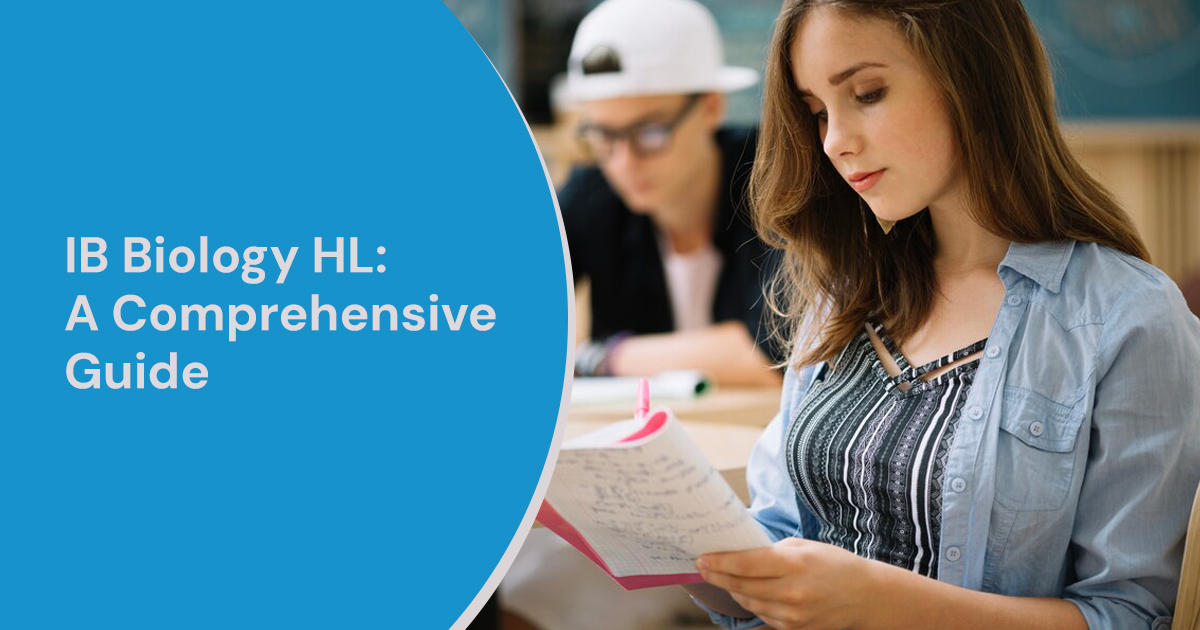IB Biology HL: A Comprehensive Guide

The International Baccalaureate (IB) Biology Higher Level (HL) is a challenging yet rewarding course designed for learners with a keen interest in biological sciences. As part of the IB Diploma Programme, IB Biology HL encourages learners to engage in critical thinking, independent research, and an in-depth understanding of the biological world. In this guide, we will explore the key components of IB Biology HL, strategies for success, and answer some frequently asked questions about the course.
Overview of IB Biology HL
IB Biology HL covers a broad range of topics, from the molecular level to ecosystems and evolution. The course is designed to offer learners a deep and comprehensive understanding of the biological sciences, while also equipping them with practical skills through laboratory experiments and independent research.
The HL course goes beyond the Standard Level (SL) in terms of depth, requiring learners to study additional topics and delve deeper into the material. The key areas of study include:
- Cell Biology
- Molecular Biology
- Genetics
- Ecology
- Evolution and Biodiversity
- Human Physiology
- Plant Biology
- Animal Physiology
Each of these topics is explored with an emphasis on developing analytical and investigative skills.
Structure of the IB Biology HL Course
The IB Biology HL course is divided into three main components:
1. Core Topics
These are topics studied by both HL and SL learners and form the foundation of the course. They cover basic biological concepts, including:
- Cell Biology: The structure and function of cells, including cell theory, membrane structure, and cellular respiration.
- Molecular Biology: Exploring the structure of DNA, protein synthesis, enzymes, and metabolism.
- Genetics: Understanding inheritance, genetic variation, and the impact of DNA technology.
- Ecology: Investigating ecosystems, energy flow, and the impact of human activity on the environment.
- Evolution and Biodiversity: The theory of natural selection, classification systems, and speciation.
- Human Physiology: Examining body systems such as digestion, circulation, respiration, and the nervous system.
2. Additional HL Topics
HL learners study additional material in greater depth, including:
- Nucleic Acids: DNA replication, transcription, translation, and gene expression.
- Metabolism, Cell Respiration, and Photosynthesis: In-depth look at the biochemical pathways.
- Plant Biology: The structure and function of plants, including reproduction, transpiration, and growth.
- Animal Physiology: The excretory, muscular, and nervous systems, along with osmoregulation and thermoregulation.
3. Internal Assessment (IA)
The IA is a major component of the IB Biology HL course, accounting for 20% of the final grade. It involves a practical investigation conducted by the learner, usually in the form of an experiment. Learners must demonstrate their ability to plan, conduct, and analyse an investigation, while also applying their knowledge of biological concepts.
How Is IB Biology HL Assessed?
The IB Biology HL assessment consists of both external and internal components:
1. External Assessment (80%)
- Paper 1: Multiple-choice questions based on core and HL topics (20%).
- Paper 2: Data-based questions and extended response questions on core and HL topics (36%).
- Paper 3: Section A consists of experimental questions, while Section B tests knowledge of the options (24%).
2. Internal Assessment (20%)
The Internal Assessment is an individual investigation. learners choose a research question, carry out an experiment, and write a detailed report. The IA offers a chance for learners to showcase their practical and analytical skills.
Tips for Success in IB Biology HL
IB Biology HL can be demanding, but with the right strategies, learners can excel. Here are some tips for success:
1. Understand the Syllabus
Familiarising yourself with the syllabus is crucial. The syllabus outlines all the topics you need to cover and gives you an idea of how each topic is weighted. Knowing the syllabus will help you organise your study time effectively.
2. Develop Strong Study Habits
Consistent study habits are key to doing well in IB Biology HL. Make a study schedule, use active recall and spaced repetition techniques, and regularly review past papers to practise exam-style questions.
3. Master the Concepts
Rather than simply memorising facts, focus on understanding the core biological concepts. Many of the questions in the IB Biology HL exams require applying your knowledge to unfamiliar situations. Being able to think critically and solve problems is essential.
4. Excel in Practical Work
Since the Internal Assessment accounts for 20% of your final grade, it’s important to take your practical work seriously. Choose an investigation that interests you, and ensure you design a methodologically sound experiment. Careful data analysis and interpretation are also vital.
5. Revise Regularly
Make sure to revise throughout the course rather than leaving everything to the last minute. This will help reinforce your understanding and allow you to identify any weak areas that need further attention.
Frequently Asked Questions (FAQs)
1. How difficult is IB Biology HL compared to SL?
IB Biology HL is significantly more challenging than SL because of the additional content and the greater depth of study required. HL learners also need to spend more time on practical work and internal assessments. However, with consistent effort and a good study plan, learners can manage the workload.
2. Do I need to take IB Biology HL if I want to study medicine?
While it's not a strict requirement for all medical schools, many universities prefer learners to have studied Biology at the HL level if they wish to pursue a degree in medicine. It provides a solid foundation in biological sciences, which is essential for medical studies.
3. How much time should I spend on the Internal Assessment?
The Internal Assessment is an important component of the course, so it’s worth dedicating a significant amount of time to it. Start early, choose a topic that interests you, and plan your investigation thoroughly. A well-designed and executed IA can greatly boost your overall score.
4. What’s the best way to prepare for the exams?
The best way to prepare for the IB Biology HL exams is through active revision. Use flashcards, mind maps, and past papers to test your understanding. Make sure you are comfortable with both factual recall and applying concepts to new situations.
5. Are there any recommended specific textbooks or resources?
There are several excellent textbooks and resources available for IB Biology HL, including the IB Biology Course Companion by Oxford University Press, and the Biology for the IB Diploma Study and Revision Guide. Additionally, online resources such as Kognity and BioNinja are helpful for reviewing key concepts and practising questions.
Conclusion
IB Biology HL is a demanding yet highly rewarding course that offers learners a comprehensive understanding of the biological sciences. With the right approach, including strong study habits, a focus on practical work, and consistent revision, learners can not only succeed in the course but also develop a deeper appreciation for biology. Whether you’re interested in pursuing a career in science or simply want to enhance your knowledge of the living world, IB Biology HL offers a valuable and enriching academic experience.




